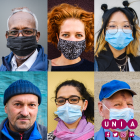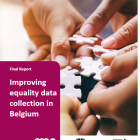Situation of travelers in Belgium following police operation ‘Strike’ on 7 May 2019
The Council of Europe, the UN Special Rapporteur on minority issues and the European Commission must investigate whether the police and judiciary did not take excessive measures against travelers. That’s what Unia says in a report on the actions of the police and the judiciary during a large-scale investigation into car scam. The report lists a range of measures that have serious consequences for entire families, including children, the elderly and the sick. It was made on the basis of testimonies.
On 7 May 2019, the police raided various residential car parks during an investigation into car scam. During this raid 90 caravans of families were confiscated, among other things. Since then, many of the families have no roof over their heads, their bank accounts have been blocked without explanation, their caravans have been confiscated or their number plates have been deregistered.
On 18 May, Unia and the French-speaking Commissioner for Children's Rights expressed their concern about this in an opinion piece published in La Libre. In it they insisted that human rights should be respected and that the government should come up with solutions.
According to the people with whom Unia spoke, the excessive measures continue to increase the risk of discrimination and inhuman and degrading treatment.
At the time of publication of this report, some twenty caravans were said to have been resold by order of the Federal Public Prosecutor's Office.
The report was delivered to the international authorities on 12 July. You can download the French and Dutch report on this page. This report was also translated in English by the European Roma Rights Centre.
Comparable publications
Annual report 2020: vulnerable human rights in times of crisis

In this extraordinary year, Unia continued to fight for human rights and equality. The corona pandemic acted like a magnifying glass. Those already in a vulnerable position were often the first or hardest hit by Covid-19 or its measures.
Identifying and tackling problematic or abusive forms of police selectivity
Unia funded a research on police selectivity, conducted in collaboration with the National Institute of Criminalistics and Criminology (NICC) and the Brussels North police zone. Main conclusion? The management of a police zone has a strong impact on police practices. It is therefore at this level that we must work to improve the relationship between the police and the population.
Evaluation of federal anti-discrimination legislation (2017)
Article 52 of the Anti-Discrimination Law states that the application and effectiveness of the anti-discrimination laws must be assessed by the Legislative Chambers. Unia has prepared an assessment report on the Anti-Discrimination Law and the Anti-Racism Law based on its own practical experience, national jurisprudence and its general expertise in the fight against discrimination.
Data on (in)equality & discrimination in Belgium: results of the project ‘Improving equality data collection in Belgium’ (2021)

"Improving equality data collection in Belgium” (IEDCB) is a Belgian project co-funded by the Rights, Equality and Citizenship (REC) programme of the Directorate-General for Justice of the European Commission. It was realised thanks to a partnership between Unia and the Equal Opportunities Team of the Federal Public Service for Justice. The project aims to improve the collection and processing of equality data in Belgium.
